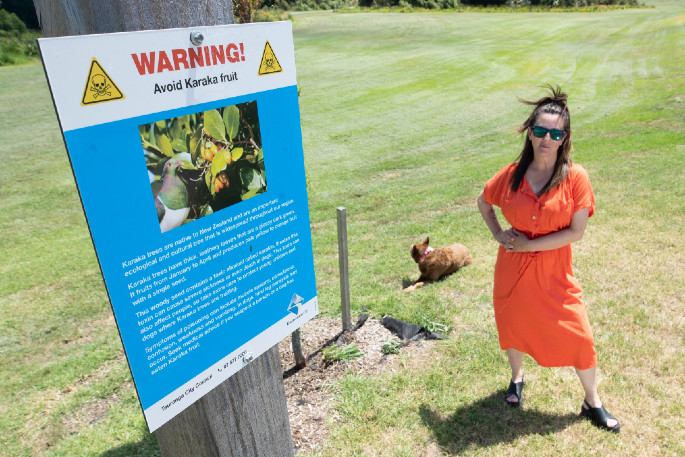A Pāpāmoa woman's ongoing quest to protect dogs from karaka berry poisoning has come on leaps and bounds.
Misha Gildenberger has lobbied Tauranga City Council since February last year to erect signage warning people of the toxic berries.
In November, council erected signs at the entries and exits of the Wairakei drainage reserve in Pāpāmoa and Daisy Hardwick Walkway in Brookfield, where karaka trees grow.
Initially the owner of Roma Pet Minding fundraised to erect her own signs, and is pleased council are now working with her to create awareness about the berries.
The pips of the berries contains a powerful neurotoxin and alkaloid poison karakin. Eating just one berry can cause a canine to have seizures and may lead to death. They are also toxic to humans but loved by Kererū birds.
The native tree fruits from January to April, and Misha has noticed the bright orange berries are already falling from trees around the walkways in Pāpāmoa.
'Now is actually the worst part of the season, because they're ripe and really tempting for dogs,” says Misha.
'It's not as simple as training your dog not to eat the berries. Some dogs will eat them, so people need to be aware about the dangers.
'A lot of people aren't aware of how toxic the fruit is, and they're not just in public places - they can also be found in people's backyards.”
In January last year, a family tragically lost their dog after it ate some the berries.
Holistic Vets director Liza Schneider, who treated the dog, says sometimes there is a one-to-two day delay between a dog eating the fruit and showing symptoms, which means it's often too late because it has been in their system for so long.
'Sadly, it progresses quite severely and dogs often don't bounce back from it,” says Liza.
The veterinarian says people need to be vigilant and proactive by watching their dogs during walks and keeping them on the lead if they are near a tree to ensure berries aren't eaten.
Signs of poisoning can be weakness and vomiting, and can progress to paralysis and convulsions.
If a person suspects their dog has eaten berries they need to get them to a vet immediately for treatment, says Liza.
Misha's mission to keep canines safe is far from over. She uses her business' social media platforms to keep people informed about other dangers for pooches.
She also worked with council on a pamphlet informing people about local hazards for dogs, including toxic sea slugs on beaches and toxic algae that can found in waterways. The brochures were included with dog registration reminder letters.
The animal advocate wants to see everyone involved in the dog industry, from vets to doggy day-cares, working together to share safety information with dog owners.



0 comments
Leave a Comment
You must be logged in to make a comment.